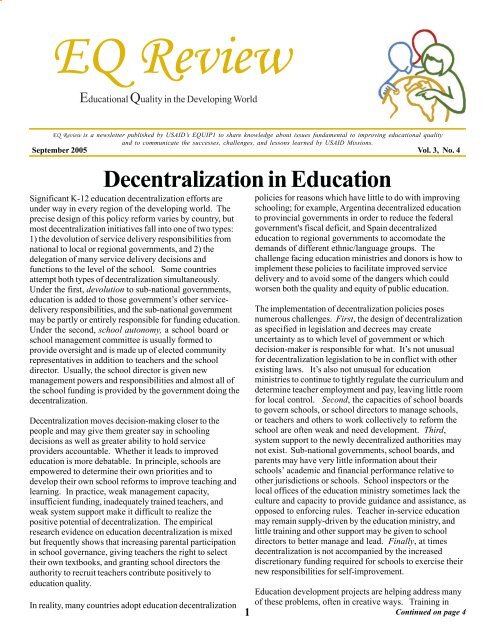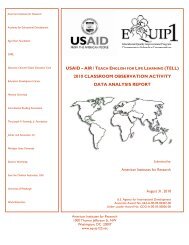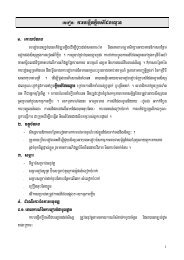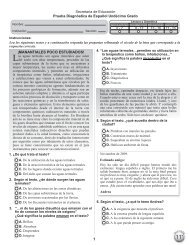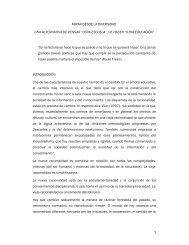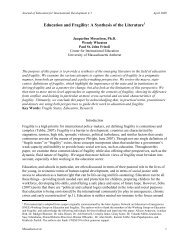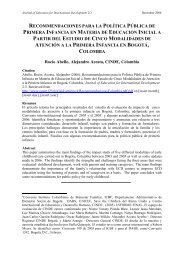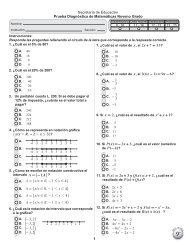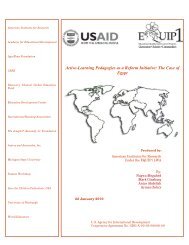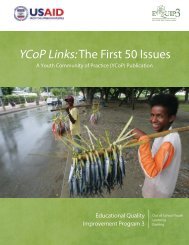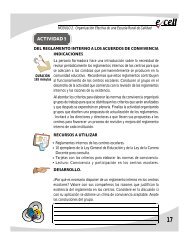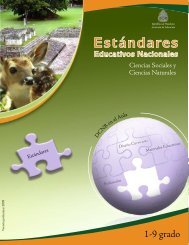Decentralization in Education - EQUIP123.net
Decentralization in Education - EQUIP123.net
Decentralization in Education - EQUIP123.net
Create successful ePaper yourself
Turn your PDF publications into a flip-book with our unique Google optimized e-Paper software.
EQ Review<br />
<strong>Education</strong>al Quality <strong>in</strong> the Develop<strong>in</strong>g World<br />
EQ Review is a newsletter published by USAID’s EQUIP1 to share knowledge about issues fundamental to improv<strong>in</strong>g educational quality<br />
and to communicate the successes, challenges, and lessons learned by USAID Missions.<br />
September 2005 Vol. 3, No. 4<br />
<strong>Decentralization</strong> <strong>in</strong> <strong>Education</strong><br />
Significant K-12 education decentralization efforts are<br />
under way <strong>in</strong> every region of the develop<strong>in</strong>g world. The<br />
precise design of this policy reform varies by country, but<br />
most decentralization <strong>in</strong>itiatives fall <strong>in</strong>to one of two types:<br />
1) the devolution of service delivery responsibilities from<br />
national to local or regional governments, and 2) the<br />
delegation of many service delivery decisions and<br />
functions to the level of the school. Some countries<br />
attempt both types of decentralization simultaneously.<br />
Under the first, devolution to sub-national governments,<br />
education is added to those government’s other servicedelivery<br />
responsibilities, and the sub-national government<br />
may be partly or entirely responsible for fund<strong>in</strong>g education.<br />
Under the second, school autonomy, a school board or<br />
school management committee is usually formed to<br />
provide oversight and is made up of elected community<br />
representatives <strong>in</strong> addition to teachers and the school<br />
director. Usually, the school director is given new<br />
management powers and responsibilities and almost all of<br />
the school fund<strong>in</strong>g is provided by the government do<strong>in</strong>g the<br />
decentralization.<br />
<strong>Decentralization</strong> moves decision-mak<strong>in</strong>g closer to the<br />
people and may give them greater say <strong>in</strong> school<strong>in</strong>g<br />
decisions as well as greater ability to hold service<br />
providers accountable. Whether it leads to improved<br />
education is more debatable. In pr<strong>in</strong>ciple, schools are<br />
empowered to determ<strong>in</strong>e their own priorities and to<br />
develop their own school reforms to improve teach<strong>in</strong>g and<br />
learn<strong>in</strong>g. In practice, weak management capacity,<br />
<strong>in</strong>sufficient fund<strong>in</strong>g, <strong>in</strong>adequately tra<strong>in</strong>ed teachers, and<br />
weak system support make it difficult to realize the<br />
positive potential of decentralization. The empirical<br />
research evidence on education decentralization is mixed<br />
but frequently shows that <strong>in</strong>creas<strong>in</strong>g parental participation<br />
<strong>in</strong> school governance, giv<strong>in</strong>g teachers the right to select<br />
their own textbooks, and grant<strong>in</strong>g school directors the<br />
authority to recruit teachers contribute positively to<br />
education quality.<br />
In reality, many countries adopt education decentralization<br />
policies for reasons which have little to do with improv<strong>in</strong>g<br />
school<strong>in</strong>g; for example, Argent<strong>in</strong>a decentralized education<br />
to prov<strong>in</strong>cial governments <strong>in</strong> order to reduce the federal<br />
government's fiscal deficit, and Spa<strong>in</strong> decentralized<br />
education to regional governments to accomodate the<br />
demands of different ethnic/language groups. The<br />
challenge fac<strong>in</strong>g education m<strong>in</strong>istries and donors is how to<br />
implement these policies to facilitate improved service<br />
delivery and to avoid some of the dangers which could<br />
worsen both the quality and equity of public education.<br />
The implementation of decentralization policies poses<br />
numerous challenges. First, the design of decentralization<br />
as specified <strong>in</strong> legislation and decrees may create<br />
uncerta<strong>in</strong>ty as to which level of government or which<br />
decision-maker is responsible for what. It’s not unusual<br />
for decentralization legislation to be <strong>in</strong> conflict with other<br />
exist<strong>in</strong>g laws. It’s also not unusual for education<br />
m<strong>in</strong>istries to cont<strong>in</strong>ue to tightly regulate the curriculum and<br />
determ<strong>in</strong>e teacher employment and pay, leav<strong>in</strong>g little room<br />
for local control. Second, the capacities of school boards<br />
to govern schools, or school directors to manage schools,<br />
or teachers and others to work collectively to reform the<br />
school are often weak and need development. Third,<br />
system support to the newly decentralized authorities may<br />
not exist. Sub-national governments, school boards, and<br />
parents may have very little <strong>in</strong>formation about their<br />
schools’ academic and f<strong>in</strong>ancial performance relative to<br />
other jurisdictions or schools. School <strong>in</strong>spectors or the<br />
local offices of the education m<strong>in</strong>istry sometimes lack the<br />
culture and capacity to provide guidance and assistance, as<br />
opposed to enforc<strong>in</strong>g rules. Teacher <strong>in</strong>-service education<br />
may rema<strong>in</strong> supply-driven by the education m<strong>in</strong>istry, and<br />
little tra<strong>in</strong><strong>in</strong>g and other support may be given to school<br />
directors to better manage and lead. F<strong>in</strong>ally, at times<br />
decentralization is not accompanied by the <strong>in</strong>creased<br />
discretionary fund<strong>in</strong>g required for schools to exercise their<br />
new responsibilities for self-improvement.<br />
<strong>Education</strong> development projects are help<strong>in</strong>g address many<br />
of these problems, often <strong>in</strong> creative ways. Tra<strong>in</strong><strong>in</strong>g <strong>in</strong><br />
1 Cont<strong>in</strong>ued on page 4
<strong>Decentralization</strong> <strong>in</strong> <strong>Education</strong><br />
Mali Regional Action Plan/<br />
Decision Mak<strong>in</strong>g (RAP-DM)<br />
The overall goal of the Mali Regional Action Plan/Decision<br />
Mak<strong>in</strong>g (RAP-DM) Project - a five-year project that<br />
began <strong>in</strong> August 2004 - is to provide technical assistance<br />
through capacity-build<strong>in</strong>g to the deconcentrated 1 structures<br />
of the M<strong>in</strong>istry of <strong>Education</strong> (MOE), <strong>in</strong>clud<strong>in</strong>g <strong>Education</strong><br />
Academies (AE) and Centers for Pedagogical Animation<br />
(CAP). The program aims to shift the delegation of<br />
responsibility from the the central to the regional m<strong>in</strong>istry<br />
offices. Regional education action plans (PARE) will be<br />
developed, plann<strong>in</strong>g and management tools improved,<br />
<strong>in</strong>formation systems re<strong>in</strong>forced, and complementarities<br />
between job skills and position profiles improved.<br />
In an <strong>in</strong>itial situation analysis that was carried out <strong>in</strong><br />
December 2004, it was noted that there is divergence<br />
between national decentralization policy and current<br />
education system management practices. This divergence<br />
may be attributed to local governments’ weak capacity to<br />
assume a role <strong>in</strong> education system management. In many<br />
cases, particularly <strong>in</strong> rural areas, the largely illiterate public<br />
does not understand the importance of tak<strong>in</strong>g on the<br />
management and f<strong>in</strong>anc<strong>in</strong>g of an education system that, <strong>in</strong><br />
general, operates outside of their sphere of understand<strong>in</strong>g<br />
and <strong>in</strong>fluence. Hence, the overall goal of the RAP-DM is<br />
to provide technical assistance to the AEs and CAPs to<br />
help them better plan and manage activities and offer<br />
support to the decentralized government structures.<br />
As part of the decentralization effort, the RAP-DM is<br />
<strong>in</strong>tegrated <strong>in</strong>to the MOE’s ongo<strong>in</strong>g efforts to implement<br />
deconcentration and decentralization <strong>in</strong> accordance with<br />
Government of Mali (GRM) policy. As such, the RAP-DM<br />
team is based <strong>in</strong> the MOE build<strong>in</strong>g which helps to facilitate<br />
the relations with some of the various m<strong>in</strong>isterial entities.<br />
The RAP-DM will provide a facility for tra<strong>in</strong><strong>in</strong>g regional<br />
MOE staff as well as provid<strong>in</strong>g cont<strong>in</strong>uous monitor<strong>in</strong>g at<br />
the AE and CAP levels.<br />
Flexible and <strong>in</strong>novative tra<strong>in</strong><strong>in</strong>g strategies such as hands-on<br />
tra<strong>in</strong><strong>in</strong>g and just-<strong>in</strong>-time methodologies will be used. The<br />
current tra<strong>in</strong><strong>in</strong>g systems are best adapted to the needs of<br />
large villages, towns, and cities. However, by us<strong>in</strong>g a more<br />
<strong>in</strong>novative system that uses a number of simple plann<strong>in</strong>g<br />
tools and takes <strong>in</strong>to account the actual needs of the<br />
tra<strong>in</strong>ees, the RAP-DM hopes to strengthen the AEs so<br />
they will be more useful and effective. The RAP-DM will<br />
organize annual national-level sem<strong>in</strong>ars on: AE Director<br />
tra<strong>in</strong><strong>in</strong>g; plann<strong>in</strong>g and budget tra<strong>in</strong><strong>in</strong>g; and evaluation of<br />
progress.<br />
2<br />
F<strong>in</strong>ally, the RAP-DM will assist the MOE <strong>in</strong> establish<strong>in</strong>g a<br />
regional education fund to encourage AEs to develop<br />
quality action plans that are based on relevant statistical<br />
data and are well monitored. The fund will also provide<br />
additional resources to AEs to support the implementation<br />
of particular activities <strong>in</strong> the education action plan that aim<br />
to improve educational quality at the primary school level.<br />
For more <strong>in</strong>formation, please contact Ibrahima Sissoko at<br />
isissoko@usaid.gov.<br />
1<br />
In the context of education <strong>in</strong> Mali, the term “deconcentration”<br />
is the devolution of decision mak<strong>in</strong>g power, and human and<br />
f<strong>in</strong>ancial resources to the regional and district level MOE’s<br />
operation units. “<strong>Decentralization</strong>” is the transfer of<br />
competencies and means (f<strong>in</strong>ancial and human resources) from<br />
central MOE to the regional and communal elected bodies so<br />
that they can fully implement their roles and responsibilities - as<br />
def<strong>in</strong>ed by law - <strong>in</strong> the education sector.<br />
Children's Learn<strong>in</strong>g Access<br />
Susta<strong>in</strong>ed <strong>in</strong> Senegal (CLASS)<br />
Students <strong>in</strong> a CLASS school <strong>in</strong> Senegal<br />
The Children’s Learn<strong>in</strong>g Access Susta<strong>in</strong>ed <strong>in</strong> Senegal<br />
project (CLASS) is a five-year USAID funded activity<br />
aimed at <strong>in</strong>creas<strong>in</strong>g access to and improv<strong>in</strong>g the quality of<br />
middle school education <strong>in</strong> Senegal. It is an <strong>in</strong>tegrated set<br />
of support activities that addresses system constra<strong>in</strong>ts that<br />
affect quality middle school education at the central,<br />
regional, school, and community levels <strong>in</strong> three target<br />
regions of Senegal. A separate teacher education<br />
component (SITT) was added to the project to strengthen<br />
the national <strong>in</strong>-service teacher tra<strong>in</strong><strong>in</strong>g system <strong>in</strong> all regions<br />
of Senegal.<br />
A ma<strong>in</strong> goal of the CLASS project is to improve<br />
decentralization and community management. This will<br />
be achieved by strengthen<strong>in</strong>g decentralization procedures<br />
at the regional and district levels and strengthen<strong>in</strong>g the<br />
capacity of the project’s targeted schools and communities<br />
to plan and implement school improvement activities that
<strong>Decentralization</strong> <strong>in</strong> <strong>Education</strong><br />
affect education quality. Specific activities <strong>in</strong>clude:<br />
• Strengthen<strong>in</strong>g the capacity of regional and<br />
departmental entities <strong>in</strong> three regions to support<br />
schools <strong>in</strong> improv<strong>in</strong>g educational quality.<br />
• Tra<strong>in</strong><strong>in</strong>g school management committees (SMCs) to<br />
become active and effective <strong>in</strong> their regions.<br />
• Tra<strong>in</strong><strong>in</strong>g targeted middle schools <strong>in</strong> the regions to<br />
develop, implement, and ref<strong>in</strong>e school development<br />
plans.<br />
As of the end of the project’s second year <strong>in</strong> August 2005,<br />
CLASS had achieved several major decentralization<br />
objectives:<br />
• Strategy workshops mobilized regional local units<br />
around topics of local education f<strong>in</strong>anc<strong>in</strong>g, partnership<br />
build<strong>in</strong>g with the M<strong>in</strong>istry of <strong>Education</strong>’s Directorate<br />
for Middle School <strong>Education</strong>, and operational<br />
diagnoses of the communities.<br />
• 20 SMC tra<strong>in</strong>ers <strong>in</strong> targeted regions were tra<strong>in</strong>ed <strong>in</strong><br />
conflict resolution and preventive ma<strong>in</strong>tenance.<br />
• CLASS produced resources needed for support<strong>in</strong>g<br />
SMCs <strong>in</strong> the development of school improvement<br />
plans, <strong>in</strong>clud<strong>in</strong>g a new tra<strong>in</strong><strong>in</strong>g module and analysis and<br />
review of project materials and key documents.<br />
For more <strong>in</strong>formation, please contact USAID/Senegal<br />
CTO Pape Sow at psow@usaid.gov.<br />
leadership and democratic behavior. The project promotes<br />
work <strong>in</strong> groups, self <strong>in</strong>itiated learn<strong>in</strong>g, democratic behavior<br />
and parent participation <strong>in</strong> the school, <strong>in</strong> such a way that<br />
the students become constructive participants <strong>in</strong> the<br />
democratic process and <strong>in</strong>volved <strong>in</strong> the social and<br />
economic life of their communities. At the same time the<br />
project strengthens the capacity of several levels of<br />
educational actors, such as the M<strong>in</strong>istry of <strong>Education</strong>, local<br />
government and others, so that they may support the<br />
schools and assume appropriate roles <strong>in</strong> the<br />
decentralization process.<br />
The project works <strong>in</strong> 140 schools, reach<strong>in</strong>g more than<br />
6,600 students, strengthen<strong>in</strong>g one-teacher and multi-grade<br />
schools. The teacher’s role is that of a facilitator of the<br />
learn<strong>in</strong>g process. Project Facilitators tra<strong>in</strong> the teachers,<br />
give technical assistance and promote the development of<br />
learn<strong>in</strong>g materials. In preparation for the regulations of the<br />
<strong>Decentralization</strong> Law the management of the school is <strong>in</strong><br />
the hands of the <strong>Education</strong>al Council (students, parents,<br />
school directors and community leaders) that develop the<br />
school plan.<br />
By comb<strong>in</strong><strong>in</strong>g active learn<strong>in</strong>g <strong>in</strong> the classroom, improved<br />
local management, and decentralization activities and at<br />
the national, regional, local and school level the project<br />
aims to improve the quality of rural education from the<br />
bottom up as well as the top down.<br />
APRENDES: Innovative <strong>Education</strong><br />
Practices <strong>in</strong> Rural Peru<br />
S<strong>in</strong>ce 2003 the Innovations <strong>in</strong> <strong>Decentralization</strong> and Active<br />
Schools (AprenDes) project has supported the Peruvian<br />
government through assistance for the 2003 <strong>Education</strong><br />
Law and its focus on decentralization, local management,<br />
improved education quality, and democratic practices <strong>in</strong><br />
the schools and school communities <strong>in</strong> rural areas of the<br />
San Martín region. USAID/Perú and the M<strong>in</strong>istry of<br />
<strong>Education</strong> are project partners, while the Academy for<br />
<strong>Education</strong>al Development is <strong>in</strong> charge of implementation.<br />
AprenDes focuses on the design of effective<br />
decentralization policies and the implementation of these<br />
policies through local management of quality education <strong>in</strong><br />
the regional and local context, focus<strong>in</strong>g on learn<strong>in</strong>g,<br />
For more <strong>in</strong>formation, please contact AprenDes CTO<br />
Eurydice Rorick at erorick@usaid.gov or visit the<br />
AprenDes website at http://www.aprendesperu.org/.<br />
Children <strong>in</strong> an APRENDES classroom <strong>in</strong><br />
San Mart<strong>in</strong>, Peru<br />
3
<strong>Decentralization</strong> <strong>in</strong> <strong>Education</strong><br />
Egypt and Namibia Projects<br />
Participate <strong>in</strong> a <strong>Decentralization</strong><br />
Workshop<br />
In an effort to assist m<strong>in</strong>istries of education and government<br />
officials improve the design and implementation of<br />
decentralization and effect better sector performance, a<br />
workshop on “The Implementation of <strong>Education</strong><br />
<strong>Decentralization</strong>: A Three Day Workshop for National and<br />
Sub-National Stakeholders” was developed. In<br />
collaboration with programmatic partner Research Triangle<br />
Institute (RTI), Academy for <strong>Education</strong>al Development<br />
(AED) Senior Global <strong>Education</strong> Development Specialist Joe<br />
Cohen conducted education decentralization workshops<br />
with two EQUIP2 Associate Awards <strong>in</strong> Spr<strong>in</strong>g 2005: the<br />
Egypt <strong>Education</strong> Reform Project (ERP) <strong>in</strong> March and the<br />
Namibia Basic <strong>Education</strong> Support Project, Phase 3 (BES 3)<br />
<strong>in</strong> May. The workshop’s primary objectives were to:<br />
• Share a common vision of the education sector’s<br />
decentralization objectives;<br />
• Facilitate understand<strong>in</strong>g of the l<strong>in</strong>k between<br />
decentralization and the quality of teach<strong>in</strong>g and<br />
learn<strong>in</strong>g;<br />
• Communicate lessons learned from <strong>in</strong>ternational<br />
experience with decentralization;<br />
• Expla<strong>in</strong> the complexity and detail required to design<br />
and implement decentralization;<br />
• Identify the pr<strong>in</strong>cipal constra<strong>in</strong>ts to implementation of<br />
education decentralization; and<br />
• Set priorities for mov<strong>in</strong>g forward.<br />
In Egypt and Namibia, participants <strong>in</strong>cluded regional and<br />
national representatives from the M<strong>in</strong>istries of <strong>Education</strong><br />
and Higher <strong>Education</strong>, the M<strong>in</strong>istry of F<strong>in</strong>ance, the M<strong>in</strong>istry<br />
of Local Adm<strong>in</strong>istration, and the M<strong>in</strong>istry of Regional and<br />
Local Government, Hous<strong>in</strong>g and Rural Development, as<br />
well as education officials from the regional governments.<br />
S<strong>in</strong>ce the status of decentralization is unique to each<br />
country, the workshop is customized to the specific context.<br />
Topics addressed <strong>in</strong>cluded exam<strong>in</strong><strong>in</strong>g progress thus far,<br />
fac<strong>in</strong>g challenges, develop<strong>in</strong>g a concrete action plan and<br />
timel<strong>in</strong>e for mov<strong>in</strong>g forward, ensur<strong>in</strong>g accountability,<br />
f<strong>in</strong>anc<strong>in</strong>g decentralized schools, and identify<strong>in</strong>g the<br />
country’s specific legal and <strong>in</strong>stitutional framework.<br />
The workshops provided a forum for various stakeholder<br />
groups to build consensus on the importance and<br />
achievements of education decentralization and engage <strong>in</strong><br />
a collegial policy dialogue. The experience <strong>in</strong> Egypt and<br />
Namibia will help EQUIP2 further ref<strong>in</strong>e its<br />
decentralization tools for presentations <strong>in</strong> Guatemala,<br />
Georgia, and Senegal over the com<strong>in</strong>g year.<br />
For questions about Egypt ERP, contact CTO Hala El<br />
Sarafy at helserafy@usaid.gov. For questions about<br />
Namibia’s BES 3, contact CTO Mart<strong>in</strong> Tjituka at<br />
mtjituka@usaid.gov. Please also visit http://<br />
www.equip123.net/webarticles//<br />
anmviewer.asp?a=285&z=92 for more <strong>in</strong>formation.<br />
From page 1, Introduction<br />
prepar<strong>in</strong>g school improvement plans, accompanied by<br />
fund<strong>in</strong>g of those plans, provides a powerful stimulus for<br />
school communities to work collectively to def<strong>in</strong>e their<br />
own priorities and to own their own school reform.<br />
Tra<strong>in</strong><strong>in</strong>g school boards and creat<strong>in</strong>g new <strong>in</strong>formation<br />
systems [e.g., school report cards] oriented towards<br />
parents rather than planners provides a basis for improved<br />
accountability. Fund<strong>in</strong>g school grants for specific<br />
purposes—textbooks, teacher tra<strong>in</strong><strong>in</strong>g, school renovation—<br />
gives schools experience <strong>in</strong> manag<strong>in</strong>g funds and empowers<br />
school boards while address<strong>in</strong>g real problems <strong>in</strong> service<br />
delivery. Establish<strong>in</strong>g and fund<strong>in</strong>g realistic m<strong>in</strong>imum<br />
standards of service provision reduces <strong>in</strong>equalities and<br />
helps ensure decentralization does not leave the poor<br />
beh<strong>in</strong>d.<br />
<strong>Decentralization</strong> is not a magical solution to the real<br />
problems fac<strong>in</strong>g K-12 education <strong>in</strong> poor countries, but the<br />
<strong>in</strong>troduction of decentralization policies provides an<br />
opportunity for change to improve school<strong>in</strong>g.<br />
For more <strong>in</strong>formation, please contact EQUIP2<br />
representative Donald W<strong>in</strong>kler, Senior Research<br />
Economist, International Development Group, Research<br />
Triangle Institute, at dw<strong>in</strong>kler@rti.org.<br />
EQ Review is a free publication created by the <strong>Education</strong>al Quality<br />
Improvement Program (http://www.<strong>EQUIP123.net</strong>) and the U.S.<br />
Agency for International Development (USAID) under cooperative<br />
agreement # GDG-A-00-03-00006-00.<br />
To contribute to EQ Review please contact;<br />
Adela Mizrachi, amizrachi@air.org, or John Hatch, jhatch@usaid.gov.<br />
4


